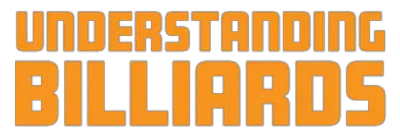If you are new to billiards or maybe you just went and bought a new case to hold your cues and are wondering what other players have in theirs. Let me show you the top 5 billiard accessories that every player has in their cases.
Every serious pool player will have these five items in their case. These five items are:
- A tip shaper for fine tuning the shape of the tip to help get better action on the cue ball.
- A pocket-chalker for carrying their chalk of choice with them in their pocket to easily and often chalk their tip.
- A cue holder to hold their cues when they are not being used, these will help them to not be knocked over and risk damage to the tip of shaft.
- A shaft burnisher for smoothing out the shaft.
- A glove to wear when palms get sweaty in order to easily be able to glide the cue across your hand during the stroke.
As you continue to read this article, I will break down what these items are, how they are used, and where you can find them for the best prices.
***Note: This article will contain affiliate links, and if you decide to use them, I may receive a small commission at no extra cost to you.
#1 Tip Shaper Tool
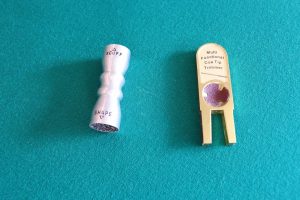
Every pool player no matter their skill level needs to have a well-shaped tip in order to play their best. This is just one of the things you must do regularly to maintain a healthy tip. Tips over time will begin to get squished and begin to mushroom out from excessive use and the force that comes from the contact from hitting the balls.
A good tip will have a nice curvature to be able to grip the curvature of the cue ball during contact. This curvature is especially important when it comes to putting English or spin on the cue ball. When you are applying spin on the cue ball you are hitting away from the center of the cue ball and the flatter your tip is the higher the chance you will miscue. So having a properly shaped tip in crucial.
How often you need to reshape your tip will depend mostly on the softness of your tip and how often you play. The softer the tip the more often it will need to be reshaped. Every time you pull your cue out to play, always take a look at your tip and make sure that the curvature you want is there if not it is time to reshape the tip.
All tip shapers have at two different size curvatures, a dime shape, and a nickel shape. The dime shape will allow for a more English to be put on the ball because you are able to hit the cue ball father away from the center without miscuing. The draw back to a dime shaped tip is that it is so sensitive to applying English that it is usually used by more experience players.
The nickel shape is not as sharp of a curvature as the dime which means you cannot apply as much English with it but it allows for a slight margin for error when striking the cue ball and not applying any unwanted English. This tip shape is great for beginner players as they learn how to control the accuracy of their stroke.
There are a few different types of tip shapers but my recommendation is this tool because it also has a tip burnisher that can help with mushroomed tips, and well as burnishing the sides of the tip as you have scuffed it up with the tool when reshaping the tip.
#2 Pocket-Chalker
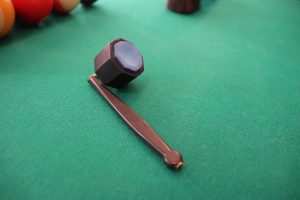
Every player should have a pocket chalker, if you don’t know what that is, it is a holder for a piece a chalk that you can carry in your pocket. They come in many different forms, some are magnetic, and you can clip onto your belt loop or pocket. I have seen some have a retractable drawing kind of like a lighter leash, if you know what that is.
The most common though will just have a little handle that slides into your pocket and the chalk will hang outside of your pocket so you don’t get chalk all over the inside of your pocket and onto anything that may be inside the pocket as well. You may be asking well why would I want to carry my own chalk.
The reason why every player should have a pocket chalker is so you can guarantee that every time you go out to shoot, you will have a quality piece of chalk to use that is in good condition. Most of the times I go out to a bar or a pool hall to shoot I will find that they either do not have a piece of chalk out on the table to use or the ones that are out have been used incorrectly and damaged. By that I mean they have been drilled down into or are all broken into pieces, and when you use those you are more likely to get more chalk onto the ferrule instead of the tip.
Now throughout my years of playing I have gone through plenty of pocket chalkers, whether I have lost them or they have broken. One of the things I recommend is to not buy the cheapest one. They just do not last, your better off spending the extra couple of dollars for a quality one.
I have tried the bullet ones, they break after a couple months use, I have also tried the magnetic belt clip ones and I seem to always knock the chalk off the clip when I’m playing. The one I recommend is the Predator one that comes with predator chalk. For one I’ve had it for about 3 years now and it has not given me any problems, and two it holds Predator chalk which is my preferred choice of chalk.
#3 Cue Holder
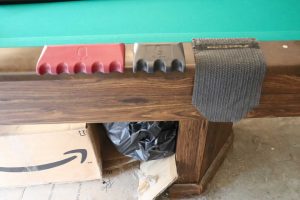
How many times have you laid one of your cues down against a chair and then someone comes by and pulls the chair out to sit down and knocks your cue over? That painful sound of your expensive cue hitting the ground, possibly denting the cue or breaking your tip off. This can be easily avoided by investing into a quality cue holder.
As the name describes, it is a holder that will hold on to your cues when they are not being used. They come in all different sizes ranging from holding a single cue to six cues. Some are just weighted to sit on top of a tabletop, and some have clamps to latch onto the table. There are all different types of brands and colors you can choose from. I personally use Q-Claw but that’s because it was the one I chose first, I don’t think there is a wrong one so choose one you like the best.
#4 Shaft Burnisher
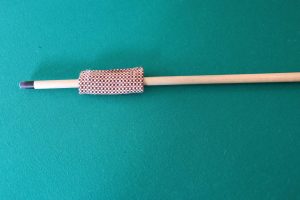
I added this item to the list because with how expensive cues can get you need to take care of them, and you can buy one of these for under ten dollars. When you use a cue over and over again the chalk from the tip and the oils from your hands will begin to penetrate the shaft. When this happens, it doesn’t just dirty your cue shaft but it makes the shaft rougher, so it won’t slide as smoothly across your bridge hand.
This piece of cloth will slide onto your shaft, and you just slide it up and down the shaft. The heat and friction caused by the movement will help to clean your shaft as well as burnish and close the pores of the wood. This will prevent chalk and oils from your skin from penetrating the wood and will keep your shaft clean and smooth. I recommend doing this after every time you play.
#5 Glove
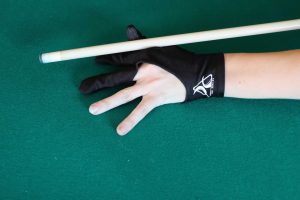
Finally, we make to the last item on the list that every player should have in their bag, the glove, whether you are right-handed or left-handed. I know a lot of players are against wearing a glove at first, but when the time comes that you need it you will be thankful you have it.
It really comes down to a personal preference of what you prefer to use when your hands get all sweaty, you can use chalk on your hands or use a glove. I prefer the glove because it keeps me from getting white chalk all over my clothes. Now I don’t always wear the glove, most of the times I play without it.
When it is hot and humid, and I find my cue sticking to my sweaty hand instead of sliding smoothly I will put on the glove. I also wear it when I’m competing in a tournament, I guess from the stress and nerves of competing, my hands will get extremely sweaty. So I am always glad I have it in my bag for whenever I may need it.
You can find gloves on Amazon with prices ranging all over the place, but I recommend not buying the cheapest. I have tried the 10 pack of cheap gloves and I’ve bought the $40 glove. They all will eventually need to be replaced, they will rip and will need to be thrown away. With that said though, you will get more use out of the more expensive glove. I normally get about 6 to 8 months out of my glove before I need to replace it. Those cheap ones you will need to replace after about two or three uses, they are terrible.
Those are the five items every pool player should have in their bag to prepare them for whatever challenges they may face in their local pool hall or bar. From tip shapers, cue holders, and shaft burnisher for keeping your cues in quality condition, to a pocket chalker and a pool glove to prepare you for your next match. Happy shooting to everyone!




